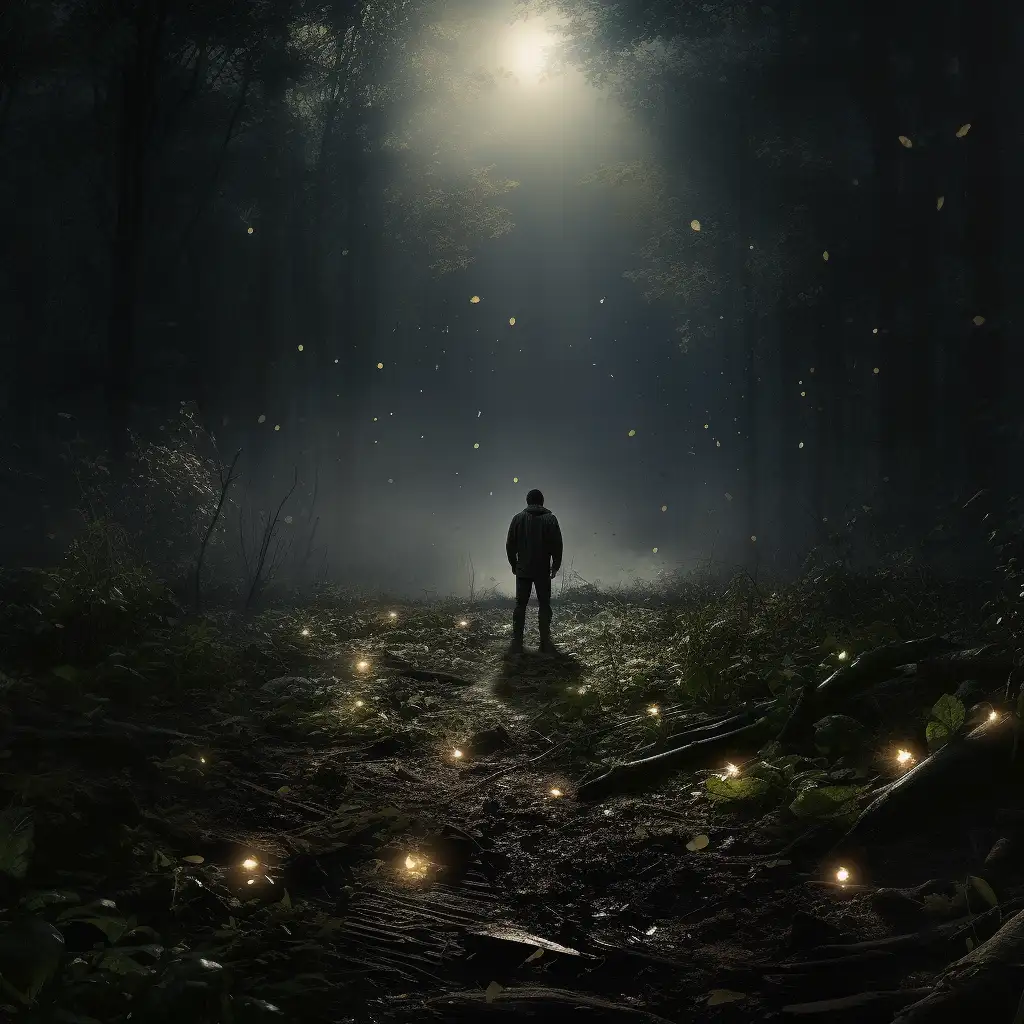Key Takeaways
2. Various theories on dreaming exist, including the housekeeping theory (brain processing experiences), problem-solving theory (brain working through complex problems), and emotional processing theory (dreams helping us understand emotions).
3. Dreams of being lost symbolize feelings of confusion, uncertainty, or transition in waking life, reflecting the human experience of seeking and exploring.
4. Dreaming of being lost can evoke strong emotions, such as fear, frustration, curiosity, or discovery.
5. Different variations of being lost in dreams carry unique symbolism, depending on the dream landscape and emotions experienced.
6. Cultural relevance and personal experiences can color the meaning of being lost in a dream.
7. Dream interpretation is diverse and influenced by cultural perspectives, making dreams of being lost a shared human experience.
8. Sigmund Freud’s psychoanalytic perspective suggests dreams reveal unconscious thoughts and emotions, while Carl Jung’s viewpoint emphasizes dreams as mirrors of the psyche.
9. Keeping a dream journal, reflecting on emotions and connections, and seeking professional guidance can help understand and navigate dreams of being lost, turning them into opportunities for self-awareness and growth.
Have you ever woken up from a dream where you were hopelessly lost, heart pounding as you struggled to find your way? This type of dream is remarkably common and can be loaded with meaning. This article is your guide through the labyrinth, as we explore what dreams about being lost could mean for you.
The Anatomy of a Dream
Now, let’s journey into the mechanics of dreams. When you close your eyes and drift off into slumber, your brain doesn’t simply flip the ‘off’ switch. Instead, it shifts into a different gear, one that delves into the world of dreams.
Dreams: More Than Just Random Images
When you dream, your brain is doing more than just projecting random images on the back of your eyelids. It’s creating an intricate web of scenarios, characters, images, and emotions that feel very real in the moment. Imagine a movie director, screenwriter, and special effects team all rolled into one—that’s your brain when you’re dreaming!
Theories of Dreaming
A tantalizing mystery that has long puzzled scientists and psychologists alike is the question of why we dream. Various theories have emerged over the centuries, each offering a unique perspective.
- The Housekeeping Theory: One suggestion is that dreaming is a form of mental housekeeping. Your brain is like a computer that needs regular maintenance. As you dream, it sifts through the experiences of the day, categorizes memories, and discards unnecessary information.
- The Problem-Solving Theory: Another theory proposes that dreaming is akin to a nocturnal brainstorming session, where your mind works through complex problems. Your dreams could be your mind’s way of experimenting with different solutions, free from the constraints of reality.
- The Emotional Processing Theory: Some theorists suggest that dreams are a way for us to process our emotions, particularly those we may not have fully dealt with during our waking hours. This theory believes that dreams provide a safe space to explore and understand these emotions.
Common Themes and the Dream of Being Lost
Just like movies and books often share common themes, so do dreams. You might find yourself being chased, falling, flying, or as we’re focusing on here, being lost. These themes seem to be universal, shared across cultures and generations. The recurrent motif of being lost can be particularly intriguing, filled with rich symbolism and potential meanings. But what does it signify? Keep reading as we delve into this question and more in the sections to follow.

The Archetypal Dream of Being Lost
Imagine this: You’re comfortably nestled in the realms of sleep, journeying through a dream. Suddenly, you find yourself in an unfamiliar setting. You could be wandering aimlessly through a strange city’s streets, trekking through a vast, labyrinthine forest, or navigating a maze with no clear exit. The feeling of being lost engulfs you. Whether it sparks fear, confusion, or a strange sense of adventure, it’s an experience many of us share. Let’s delve into why being lost is such a pervasive theme in our dreams.
A Universal Experience
Experiences in dreams can be incredibly diverse, influenced by factors such as our personal circumstances, cultural backgrounds, and unique fears or desires. However, there are some dream scenarios, like being lost, that transcend these individual differences. These dreams are universally experienced, regardless of who we are or where we come from. The question that piques our curiosity is, why is the theme of being lost so prevalent?
The Symbolism of Being Lost
In the world of dreams, being lost isn’t merely a geographical predicament. It carries deep symbolic significance, often reflecting feelings of confusion, uncertainty, or transition in our waking lives. These feelings are inherent to the human experience—thus, dreams about being lost are widespread.
Emotional and Psychological Resonance
Being lost in a dream often elicits strong emotions, whether it’s fear, frustration, or a sense of panic. On the flip side, it can also bring feelings of curiosity and discovery. This emotional resonance could be another reason why such dreams are so common. They allow our subconscious to explore and express a wide range of emotions, offering insights into our psychological state.
The Influence of Everyday Experiences
Lastly, our everyday experiences influence our dream world significantly. Given that navigating and finding our way—both literally and metaphorically—is a fundamental part of our lives, it’s no surprise that themes of being lost frequently surface in our dreams. We are constantly seeking, exploring, and often, trying to make sense of the world around us and our place in it. This enduring quest can often manifest as dreams of being lost.
Decoding Dreams of Being Lost
Dreams are more than fantastical journeys through surreal landscapes. They often reflect our inner states, fears, hopes, and experiences. When you’re lost in a dream, it’s like peering into a symbolic mirror of your psyche. So, let’s decode these mysterious dreams together.
Inner States and Dream Symbolism
Dreams about being lost can act as a lens, allowing you to view your internal world from a fresh perspective. Feeling lost in a dream could be a reflection of feeling lost in your waking life.
Uncertainty and Transition
Are you grappling with uncertainty in a relationship? Or perhaps you’re navigating a challenging transition at work or in your personal life. Your subconscious mind could be expressing these feelings of disorientation and confusion through the dream of being lost.
Personal Growth
Contrarily, dreams of being lost could symbolize personal growth. Stepping out of your comfort zone, exploring new territories, and seeking your own path—these are all facets of personal development that might manifest in your dreams as being lost.
The Specifics Matter
Just as every picture tells a story, so does every detail in your dream. The interpretation of your dream can change significantly based on its specifics. So, it’s time to put on your detective hat and get to the heart of your dream.
Aimless Wandering or Purposeful Searching?
In your dream, were you wandering aimlessly, or were you on a quest, searching for something specific? The answer can offer important clues about what your dream is trying to communicate. Aimless wandering might symbolize feelings of confusion or lack of direction. On the other hand, if you’re searching for something, it could represent a goal or desire you’re pursuing in real life.
Unpacking the Variations
Dreams of being lost are like snowflakes—no two are exactly the same. They are colored by the specifics of your dream landscape and the accompanying emotions. As we unpack these variations, you’ll realize your dreams are a beautifully complex tapestry of symbolism and personal meaning.
Lost in Different Locations
Location, location, location—it’s not only crucial in real estate, it’s also significant in your dreams. Where you find yourself lost can drastically shape your dream’s interpretation.
Lost in a City
Finding yourself lost in a city in your dream might signify feelings of being overwhelmed. Cities are bustling, fast-paced, and full of distractions. This could reflect a situation in your life where you feel like you’re struggling to keep up or losing your personal identity amid the hustle and bustle.
Lost in a Forest
On the other hand, if you’re lost in a vast, winding forest, it could symbolize a longing for a return to nature or a simpler life. Forests are often associated with peace, tranquility, and introspection. Or, the forest could symbolize feeling adrift in your personal life, with the trees representing obstacles or challenges you’re trying to navigate.
Dream Characters: You’re Not Alone (Or Maybe You Are)
Your dreams can be a bustling crowd or a solitary retreat—it all depends on the narrative your subconscious is spinning. The presence (or absence) of other characters in your dream adds another layer to its interpretation.
Being Lost Alone
If you’re wandering lost by yourself, it might represent feelings of loneliness or independence. It could suggest you’re feeling isolated in a situation, or maybe it represents a journey of self-discovery that you must undertake alone.
Being Lost with Others
Conversely, if you’re lost with someone else, think about your relationship with that person in your waking life. Their presence could indicate that the same feelings of being lost apply to the relationship or that you’re embarking on a joint journey that’s currently lacking clarity.

Dreams About Being Lost and Culture
Culture is like a prism, refracting our dreams into a spectrum of diverse interpretations. It adds another layer of complexity to your dream’s tapestry of meanings. By exploring these cultural perspectives, you can gain a broader understanding of your dreams of being lost.
Spiritual Transformation
In certain societies, dreams of being lost carry a spiritual connotation. They might be viewed as a representation of a spiritual journey—a journey fraught with confusion and doubt but leading to profound transformation and enlightenment. If you identify with this interpretation, consider whether your dream is reflecting a deeper quest for spiritual knowledge or personal growth.
Symbolizing Challenges Ahead
In other cultures, being lost in a dream might symbolize upcoming challenges or tests. Just as being physically lost involves overcoming obstacles to find your way, these dreams could reflect future hurdles you’ll need to navigate.
Cultural Symbols and Landmarks
The specifics of your dream can also take on additional cultural significance. For instance, if you dream of being lost in a place or among symbols that have a particular cultural relevance to you, it could color your dream’s meaning. It might connect to your cultural identity, your sense of belonging, or conflicts between your personal beliefs and cultural norms.
Shared Humanity, Diverse Interpretations
At the end of the day, dreaming about being lost is a shared human experience. However, the interpretations of this dream can be as diverse as our cultures. This diversity is a testament to the rich tapestry of human psychology and cultural perspectives. As you explore your dreams, remember to consider the cultural context—it might just shed new light on your understanding of your dream.
Psychological Perspectives
Dreams provide a unique portal into our minds, offering a tantalizing glimpse of our psychological landscape. Over the years, great thinkers like Sigmund Freud and Carl Jung have interpreted dreams from different angles. Let’s take a moment to explore how these perspectives might interpret your dream of being lost.
Sigmund Freud: Unearthing Repressed Feelings
Sigmund Freud, often referred to as the father of psychoanalysis, held the belief that our dreams are gateways to our unconscious minds. He suggested that they might harbor repressed feelings, desires, or memories—things we’ve pushed away from our conscious awareness.
In the context of a dream about being lost, Freud might suggest that the dream represents repressed feelings or memories. The feeling of being lost could be symbolic of your emotional state related to these hidden aspects of your psyche. Is there a forgotten memory or stifled emotion your subconscious is urging you to confront?
Carl Jung: A Journey Towards Self-Realization
On the other side of the spectrum, we have Carl Jung. Jung proposed the concept of ‘individuation,’ a lifelong process of self-realization and self-understanding.
A Jungian interpretation of your dream might suggest that it represents a journey toward self-realization. Being lost could be an indication of your current state in this journey—perhaps you’re at a crossroads, searching for direction on your path to self-discovery.
Modern Psychology: Mirrors of Anxiety or Stress
Modern psychology often approaches dreams as reflections of our emotions, particularly those we might struggle with in our waking lives. From this perspective, dreams of being lost could represent feelings of anxiety or stress.
Being lost could symbolize your perceived lack of control or uncertainty in certain areas of your life. It might reflect feelings of being overwhelmed or unequipped to deal with a situation.
Dealing with Dreams of Being Lost
So, you’ve just woken up from a dream where you were lost. You might be feeling confused or a little bit unsettled. But don’t worry, you’re not alone. Here are some practical steps you can take to work through these dreams and glean potential insights from them.
Keep a Dream Journal
First things first, start keeping a dream journal. When you wake up from a dream, try to write down as many details as you can remember. It’s like being a detective at the scene of an event, collecting evidence to piece together a narrative.
Your dream journal can act as a map, tracking patterns and themes over time. It could be that your dreams of being lost occur during particularly stressful periods or follow specific events. Understanding these patterns can provide valuable insights into what your dreams might be communicating.
Reflect and Connect
Take time to reflect on your dream and connect it with your waking life. Is there a situation in your life where you feel out of control or uncertain? How does the emotion in the dream compare to what you’re feeling in real life? These connections might not be immediately apparent—it’s okay, be patient with yourself.
Seek Professional Guidance
If these dreams of being lost are recurring and causing you distress, it might be beneficial to seek help from a professional, such as a psychologist or a certified dream analyst. They can provide a safe space to explore these dreams and offer techniques to manage and understand them better.

Practical Application: Turning Dreams into Action
So far, we’ve embarked on an intriguing journey through the landscape of dreams. But here’s where things get truly exciting. By translating your dreams into actionable insights, you can turn these subconscious narratives into catalysts for personal growth.
Seek Guidance and Slow Down
Are your dreams of being lost often paired with feelings of anxiety or panic? Maybe they occur when your life feels chaotic or out of control. If so, it might be your subconscious mind telling you to slow down.
Consider seeking guidance, whether that’s speaking with a mentor, reaching out to a trusted friend, or consulting a mental health professional. Sometimes, external perspectives can help illuminate a path through what feels like a disorienting maze.
Chart Your Own Course
What if you’re not anxious in your dreams, but rather curious or determined? In this case, being lost might symbolize a break from familiar paths and routines. Perhaps you’re being called to forge your own path, to step out of your comfort zone and explore new possibilities.
Take this as an opportunity to reassess your life. Are there areas where you’re merely going along with the crowd? Maybe it’s time to chart your own course and pursue what truly matters to you.
Embrace Uncertainty and Grow
Finally, remember that it’s okay to be uncertain. Uncertainty doesn’t mean you’re off track—it often means you’re on the brink of growth and change. Instead of resisting feelings of being lost, try embracing them. They might be signaling that you’re stepping into new, uncharted territories of personal development.
Conclusion
As we wind up our journey into the world of dreams, remember that the dreamer’s feelings and experiences are a critical part of any dream interpretation. Your dreams about being lost can provide valuable insights into your life and emotions, offering guidance through uncertain times. So the next time you find yourself lost in a dream, don’t fear. Instead, see it as an opportunity for introspection and growth.
FAQs
A: Dreams about being lost often stem from feelings of uncertainty, anxiety, or a sense of directionlessness in your waking life. They might also symbolize a fear of losing your way or not being in control of your circumstances.
Q: What does it mean if I’m trying to find my way in a dream but can’t?
A: Struggling to find your way in a dream often represents a real-life struggle to make decisions or find a clear path forward. It could suggest that you’re feeling stuck or unsure about the choices you need to make.
Q: Are there any positive interpretations of being lost in dreams?
A: Yes, some positive interpretations exist. Being lost in a dream can also signify a willingness to explore new opportunities or a desire for adventure and personal growth.
Q: Can recurring dreams about being lost be significant?
A: Yes, recurring dreams usually hold greater significance than one-time dreams. If you repeatedly dream about being lost, it may signal a persistent issue that your subconscious mind is urging you to address.
Q: Can dreams about being lost predict the future?
A: Dreams are not reliable predictors of the future. Instead, they reflect your current thoughts, feelings, and experiences. Treat them as a window into your subconscious rather than fortune-telling tools.
Q: Should I be worried if I frequently dream about being lost?
A: Frequent lost dreams might indicate underlying stress or unresolved issues. While not necessarily a cause for immediate concern, it may be beneficial to explore the possible reasons behind these dreams and address any related concerns.



